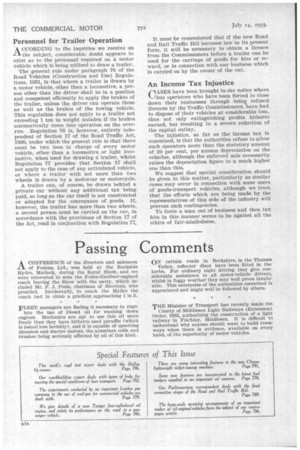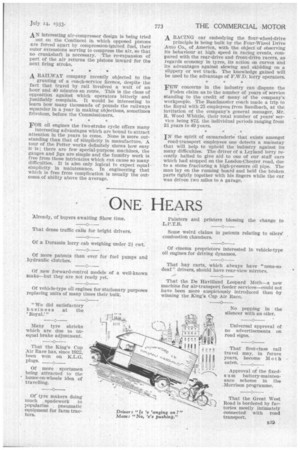Passing Comments
Page 32

Page 33

If you've noticed an error in this article please click here to report it so we can fix it.
ACONFERENCE of the directors and salesmen of Fodens, Ltd., was held at the Rockside Hydro, Matlock, during the Royal Show, and we were interested to note the Foden-Gardner-engined coach leaving the Show with the party, which included Mr. F. J. Poole, chairman of directors, who presided. Incidentally, to reach the Hydro the coach had to climb a gradient approaching 1 in 3.
FLEET managers are finding it necessary to regu late the use of Diesel oil for washing down engines. Mechanics are apt to use this oil more freely than they have hitherto used paraffin (which is issued less lavishly), and it is capable of upsetting dynamos and starter motors, the armature coils and brushes being seriously affected by oil of this kind.
ON certain roads in Berkshire, in the Thames
Valley, reflector discs have been fitted in the kerbs. For ordinary night driving they give considerable assistance to all motor-vehicle drivers, whilst in foggy weather they may well prove invalnable. This enterprise of the authorities concerned is appreciated and might well be followed by others.
THE Minister of Transport has recently made the County of Middlesex Light Railways (Extension) Order, 1933, authorizing the construction of a light railway in Finc'hley, Middlesex. It is difficult to understand why anyone should want to build tramways when there is evidence, available on every hand, of the superiority of motor vehicles.
AN interesting air-compressor design is being tried
out on the Continent in which opposed pistons are forced apart by compression-ignited fuel, their outer extensions serving to compress the air, so that no crankshaft is necessary. The re-expansion of part of the air returns the pistons inward for the next firing stroke.
A RAILWAY company recently objected to the granting of a coach-service licence, despite the fact that travel by rail involved a wait of an hour and 40 minutes en route. This is the class of opposition against which operators bitterly and justifiably complain. It would be interesting to learn how many thousands of pounds the railways squander in a year in making objections, sometimes frivolous, before the Commissioners.
FOR oil engines the two-stroke cycle offers many
interesting advantages which are bound to attract attention in the years to come. None is more outstanding than that of simplicity in manufacture. A tour of the Petter works definitely shows how easy it is ; there are few special-purpose machines, the gauges and jigs are simple and the foundry work is free from those intricacies which can cause so many difficulties. It is also only logical to expect equal simplicity in maintenance. In engineering that which is free from complication is usually the outcome of ability above the average. A RACING car embodying the four-wheel-rdrive principle is being built by the Four-Wheel Drive Auto Co., of America, with the object of observing its behaviour at high speed in racing events, compared with the rear-drive and front-drive racers, as regards economy in tyres, its action on curves and its advantages against slewing and skidding on a slippery or wet track. The knowledge gained will be used to the advantage of F.W.D. lorry operators.
FEW concerns in the industry can dispute the Foden claim as to the number of years of service standing to the credit of many of the company's workpeople. The Bandmaster coach made a trip to the Royal with 25 employees from Sandbach, at the invitation of the company's general manager, Mr. R. Wood Whittle, their total number of years' service being 872, the individual periods ranging from 31 years to 49 years.
IN the spirit of camaraderie that exists amongst
road-transport employees one detects a mainstay that will help to uphold the industry against its many difficulties. The driver of a Leyland lorry recently halted to give aid to one of our staff cars which had stopped on the London-Chester road, due to a stone fracturing a high-pressure oil pipe. The man lay on the running board and held the broken parts tightly together with his fingers while the car was driven two miles to a garage. •




























































































